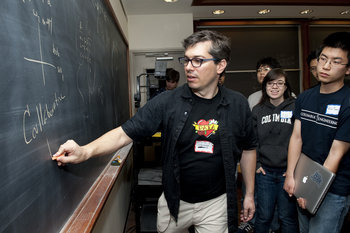
Pragmatism | Dealing the messy realities of the real world in a grounded and flexible way. |
Intentionality | The ability to formulate your own intentions. |
Design thinking | Seeing design as a way to solve a broad range of problems. |
Generative optimism | Using an optimistic and unconstrained frame of mind to generate ideas. |
Defensive pessimism | Using a critical view to validate ideas. |
Practical thinking | Concern with the usefulness of things as opposed to higher level viewpoints such as aesthetics or emotion. |
Introspection | The ability to examine your own thoughts, mood, emotions and character. |
Intuition | Knowing things without conscious thought. |
Analytical thinking | Breaking things down into parts. |
Logical thinking | |
Cold logic | Systematic thinking that neglects human realities. For example, thinking only in terms of money and ignoring how people are impacted. |
Creative thinking | Generating non-obvious ideas. |
Critical thinking | Evaluation and critique. |
Reflective thinking | Deep thinking that considers things at different levels. |
Strategic thinking | Planning how to achieve goals in an environment of constraints and competition. |
Tactical thinking | Looking for opportunity and risk in fast moving situations. |
Systems thinking | Considering the end-to-end impact of change to complex things. |
Divergent thinking | Thinking about problems that have no correct answer. |
Convergent thinking | Finding the unambiguous correct answer to a problem. |
Reasoning | Systematic and reasonable thinking. |
Rational thinking | Logic + consideration of human realities. |
Deductive reasoning | Working from the general to the specific. |
Inductive reasoning | Working from the specific to the general. |
Analogical reasoning | Using analogies to reduce complexity or to look at things from new perspectives. |
First principles | Using guidelines with broad explanatory power known as first principles. |
Big-picture | Thinking about all possibilities without concern for details. |
Myoptic thinking | Optimizing the same thing over and over again without concern for the big picture. |
Diligence | Paying attention to detail and doing things correctly. |
Realism | Accurate thinking that lacks color or optimism. |
Pessimism | Overestimating risk and underestimating the good and potential in things and people. |
Nihilism | Feeling that nothing has any value or meaning. |
Cynicism | An inaccurately dark view. |
Skepticism | Not believing in anything without absolute proof. |
Objectivity | Trying to remove your own subjective viewpoint from your analysis. |
View from nowhere | An attempt at objectivity that becomes terribly dislodged from reality. |
Evidence-based thinking | Referencing data in your thinking. This is far from foolproof as logic based on data can certainly be wrong. |
Confirmation bias | Looking for data to support what you want to believe. |
Motivated reasoning | Logical reasoning that is shaped by your motivations such that it may be incorrect. |
Black and white thinking | Assigning things into categories such as good and bad without examining the complexities in-between. |
Conceptual thought | Thinking using abstract concepts. A high level human ability. |
Heuristics | Using approximations based on limited information. |
Imagination | The ability to thinking about that which doesn't exist yet. |
Idealism | The belief that ideas shape the world such that imagination is the source of value creation. |
Counterfactual thinking | Thinking about how the past could have been different. |
Emergent thinking | Viewing thought as a process where one thought leads to another and new ideas emerge. |
Constructive thinking | Thinking about how to build things up. |
Win-win thinking | Trying to find ways that everyone wins. |
Abundance mindset | The belief that there is enough for everyone such that the successes of others don't diminish your own. |
Scarcity mindset | The belief that there isn't enough such that other people are taking from you. |
Win-lose thinking | The belief that others must lose for you to win. |
Stoicism | The belief that it is only your own virtue that matters such that you are indifferent to both good and bad fortune. |
Social thinking | Thinking about social things and the social, emotional and cognitive state of others. |
Collaborative thinking | Using social processes and communication to solve problems or make decisions. |
Playful thinking | Thinking in a joyful and non-serious way. |
Fluid intelligence | The ability to learn and adapt to novel situations. |
Crystallized intelligence | The ability to apply knowledge and experience. |
Spatial reasoning | The ability to think about objects and movement in 3d space. |
Visual thinking | Thinking in pictures. |
Embodied cognition | Thinking with movement of the body. |
Biases | Biases are flawed patterns of thought that are common in human thinking. |
Wishful thinking | Thinking that things will happen simply because you want them to happen. |
Magical thinking | Applying magical qualities to things such as science and technology without being able to explain how these things work. |


























